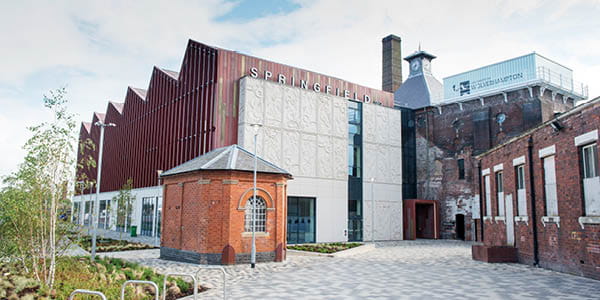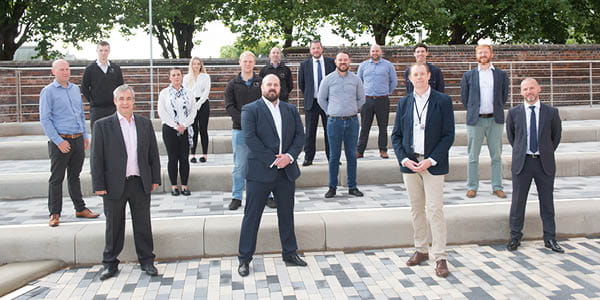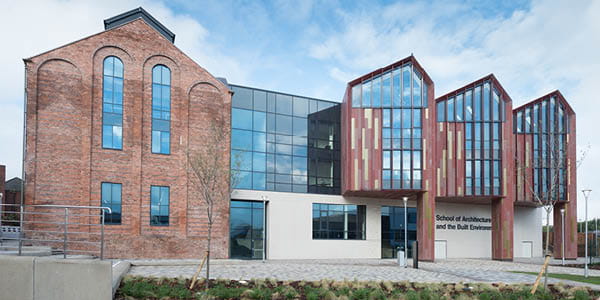
New University of Wolverhampton building holds the key to brownfield regeneration

The University of Wolverhampton has taken delivery of the keys to another new building on its flagship Springfield Campus regeneration project – opening the doors for the future of brownfield regeneration.
ISG officially handed keys over for the new £28m School of Architecture and Built Environment (SoABE) following completion of the building work which started in October 2018.
Despite work being temporarily disrupted on the site due to pandemic lockdown restrictions in March, ISG carried out the remainder of the work with a reduced workforce, in line with revised protocols and protective measures enabling progress.
The new building, designed by Birmingham based Associated Architects, is the latest addition to the University’s £100m investment in a new construction excellence campus at the former brewery.
Professor Geoff Layer, vice-chancellor at the University of Wolverhampton, said: “This is a momentous occasion for the University and the culmination of a vision which has transformed a derelict piece of land into a magnificent place of learning and research which will change the way people view brownfield regeneration.
“Since the purchase of Springfield in 2014, the derelict site has been rejuvenated into a centre of excellence for construction and the built environment, delivering an unbeatable skills pathway for construction education and training from the age of 14 to senior professionals and acting as a catalyst for economic and social regeneration.
“The new School of Architecture and Built Environment is investing and growing to meet the demands of modern industry and our strong links with employers enable programmes to be developed to closely match their needs – this offers our graduates great employment opportunities upon completion of their degree course.”
Izabella Lukasik has just completed a degree in architecture and will be studying for a master’s degree in the same subject in September. She said: “I like to challenge myself and I decided to do a degree. I chose architecture because I am an artist and it seemed like another step for me. The lecturers always have been really helpful and the fact that there are small classes allows us to have really good contact. I’m really looking forward to starting my master’s degree and being able to study in this fantastic new building.”
Wayne Flannery, ISG regional director, said: “It has been truly inspiring to be involved in the realisation of this outstanding regeneration project and help transform this site from its industry entrenched roots to the centre of learning excellence we see before us today. It is through full stakeholder collaboration that this project has been such a success, enabling an atmosphere of unshakable co-operation from all involved to create Europe’s largest built environment campus, in the heart of the UK.

“Delivery through the Pagabo Framework enabled early contractor engagement and stakeholder involvement allowing the successful journey and seamless handover of this project. Once the location of the Springfield Brewery, it has been transformed into the visionary new School of Architecture and the Built Environment, home to leading state-of-the-art learning facilities that will shape the next generation of industry leaders while maintaining elements of its heritage, such as the restored iconic brewery clock tower. This detailed and creative approach is what makes this project a beacon of success and an example for future schemes.”
Simon Kendall, regional director at Faithful+Gould and project lead on SoABE, said: “It has been a long journey with every effort made to treat the existing buildings with respect and bring the heritage of the site back to life for future generations so it’s really satisfying to see the building being handed over to the university.
“The project will provide a fantastic opportunity for future construction professionals to understand how buildings fit together and work and be an exemplar of how to regenerate an historic site with a careful blend of restoration and sympathetically designed new buildings.”
The 7,900 sq m build has used a mix of pre-cast white concrete, bronze metal cladding and glazing over three floors. An impressive saw-tooth roof echoes the historic industrial buildings that stood on the site.
The new School of Architecture and Built Environment offers specialist teaching and social learning spaces, design studios, specialist labs, multi-disciplinary workshops, lecture theatre, cafe, offices, meeting rooms, ICT rooms and a top floor super studio with double height ceilings. It will provide space for nearly 1,100 existing students and 65 staff, with the number of students projected to grow over time to 1,600.
The School will specialise in supporting skills in architecture, construction, civil engineering, building control, building services, facilities management, quantity surveying, planning, construction management, housing and commercial.
Home to the West Midlands University Technical College, the University’s School of Architecture and Built Environment, and the Elite Centre for Manufacturing Skills, the regeneration of the former Springfield Brewery is central to the University’s vision of enhancing the student experience and supporting business growth. It will also be home to the University’s new National Brownfield Research Institute for which he University recently secured £14.9m funding from the government’s Get Building Fund.
The new School of Architecture and Built Environment is due to open in September 2020.


